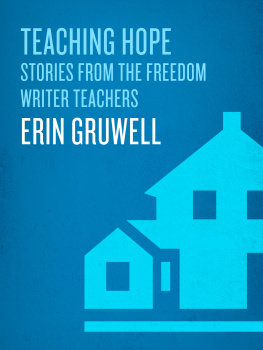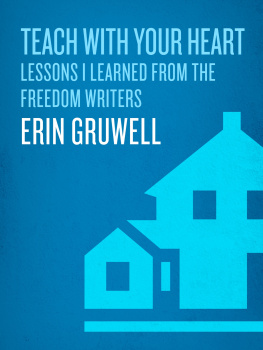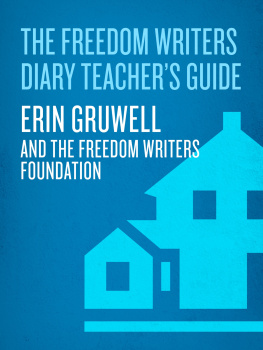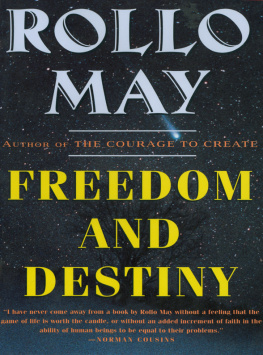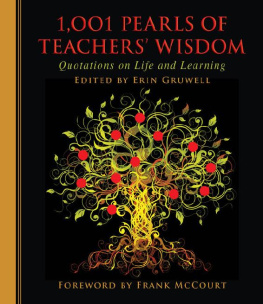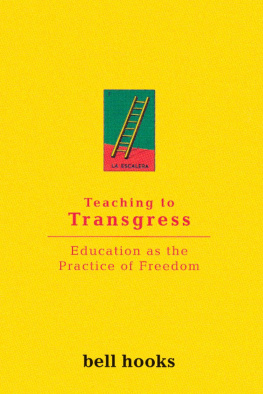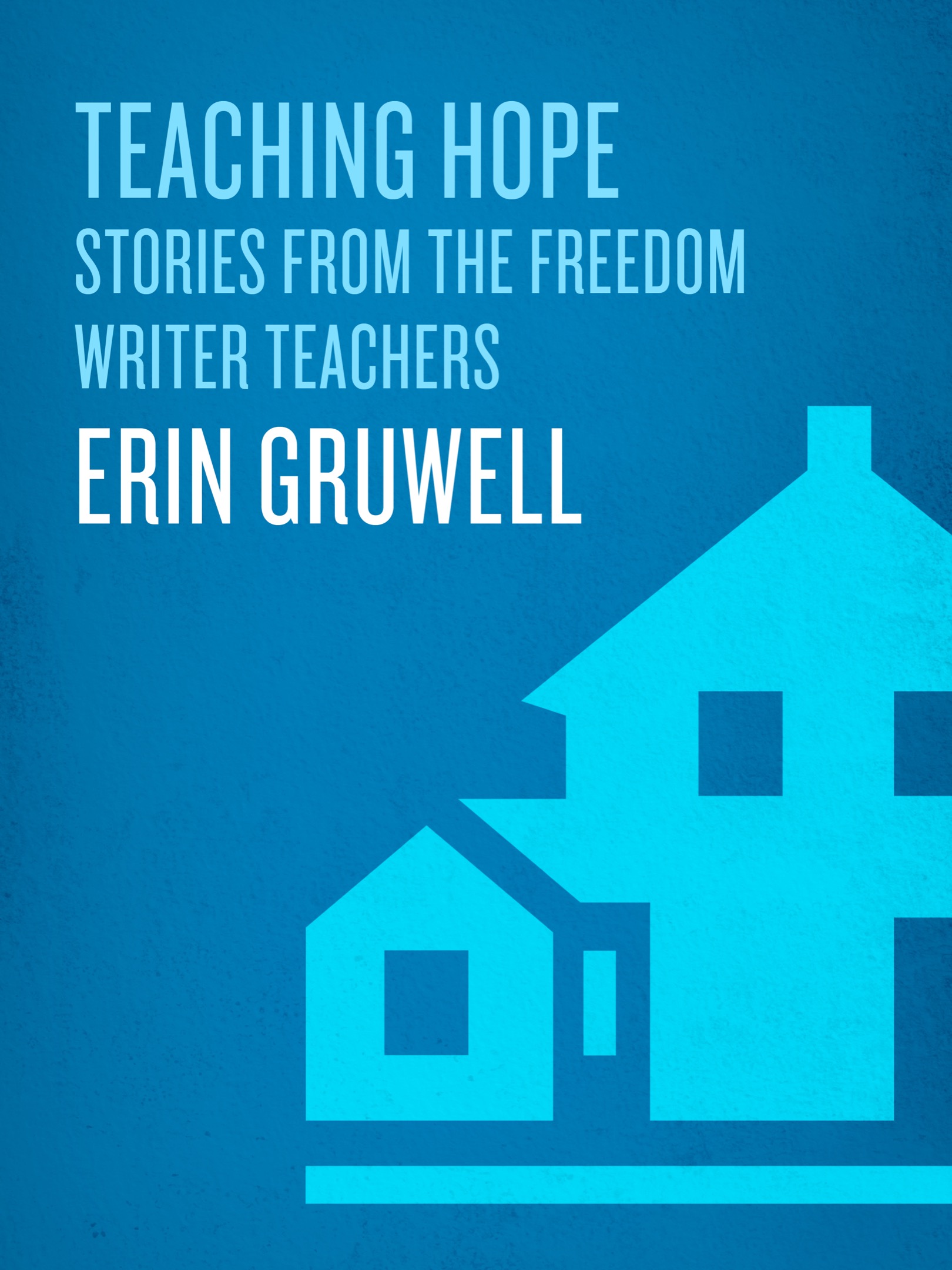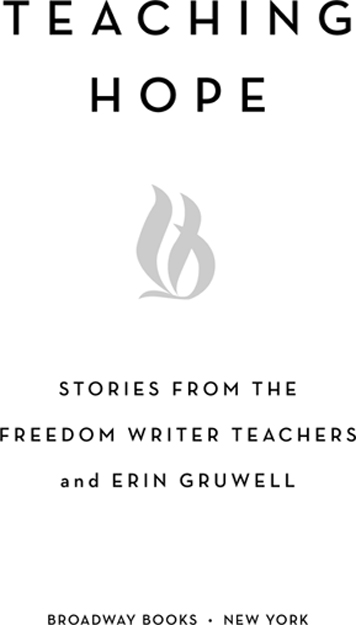FOREWORD
ANNA QUINDLEN
A ny columnist who makes sweeping generalizations is looking for trouble, but I once did just that in an essay I wrote for Newsweek. Teachings the toughest job there is, I said flatly, and the mail poured in. Nursing is tough. Assembly line work is tough. Child rearing is tough. There were even a few letters with some of those old canards about the carefree teachers life: work hours that end at 3 p.m., summers at the beach.
I imagine that the people who believe thats how teachers work dont actually know anyone who does the jobif they did, they would know that classes may end at 3 p.m., but lesson planning and test correcting go on far into the night, while summers are often reserved for second jobs, which pay the bills. But Im lucky enough to know lots of teachers, and thats why I stuck by my statement. More important, Ive taught a class or two from time to time, and the degree of concentration and engagement requiredor the degree of hell that broke loose if my concentration and engagement flaggedmade me realize that I just wasnt up to the task. It was too hard.
But if hard was all it was, no one would ever go into the profession, much less the uncommonly intelligent people who, over the years, taught me everything from long division to iambic pentameter. I dont remember much at this point in my life, but I remember the names of most of the teachers Ive had during my educational career, and some of them I honor in my heart almost every day because they made me who I am, as a reader, a thinker, and a writer.
So when I first read about Erin Gruwell and the Freedom Writers, it came as no surprise to me to discover that the truth about teaching was that it was sometimes a grueling job with near-miraculous rewards, for students and for teachers alike. In Erins first, internationally known book, The Freedom Writers Diary, you saw this mainly through the eyes of her high school students, young men and women living with combative families, absent parents, gang warfare, teenage pregnancies, and drug abuse. Above all, they lived with the understanding that no one expected them to do anythingnot just anything great, but anything at all. Theyd been given up on by just about everyone before they even showed up in class.
Except for Ms. G, as they called her, who was too inexperienced and nave to get with the surrender or the cynicism program. Her account of assigning her students to write candidly about their own lives and thereby engaging them in the educational process, of how many of them went on to college and to leadership roles in their communities, is a stand-up-and-cheer story. Thats why it was turned into a movie, and why Erins model has now been replicated in many other schools.
That first book contained the stripped-bare writings of those students, but in this one, its the teachers turn to give the rest of us a window into how difficult their job can be. In a way I never could, they answer the naysayers who question the rigor of their jobs. Here are the real rhythms of a good teachers life, not bounded by June and September, or eight and three, but boundless because of the boundless needs of young people today and the dedication of those who work with them. These are teachers who attend parole hearings and face adolescents waving weapons, who teach students they know are high or drunk or screaming inside for someone to notice their pain. Sitting at the funeral of a high school student for the third time in less than a year is how one teacher begins an entry. There are knives and fists, and then there is the all-too-familiar gaggle of girls who are guilty of a drive-by with words, trafficking in the gossip, innuendo, and nastiness that have been part of high school forever. One teacher recalls a reserved and friendless young woman with great academic potential and a wealthy family, and the evening the maid found her hanging, as silent as the clothing beside her, in the closet. Another gets a letter from a former student with a return address in a state prison, with this plea: I know youre busy but I would be very grateful if you would write to me.
Yet despite so many difficulties, these are also teachers who weep when budget cuts mean they lose their jobs, teachers who quit and are horrified at what theyve done and then unquit, as one describes it. Some of them have faced the same problems of racial and ethnic prejudice or family conflict as their students, and see their own triumphs mirrored in those of the young people they teach and, often, mentor. One, hilariously, writes of how she is undateable because of the demands of her work: Im going to have a doozy of a time finding someone willing to welcome me and my 120 children into his life.
Teachers had an easier time when I was in school, I suspect. Or maybe back then the kinds of problems and crises that confront todays students existed but were muffled by silence and ignorance. Certainly I was never in a classroom where a student handed over his knife to the teacher. I never had a classmate who was homeless, or in foster care, or obviously pregnant.
And yet many of the teachers here speak my language: of pen pals, class trips, missed assignmentsand, above all, of that adult at the front of the room who gives you a sense of your own possibilities. Isnt that the job of every teacher, one of them writes, to make every student feel welcome, to make every student feel she or he belongs, and to give every student a voice to be heard!
And so I stick with my blanket statement: Its the toughest job there is, and maybe the most satisfying, too. There are lives lost in this book, and there are lives saved, too, if salvation means a young man or woman begins to feel deserving of a place on the planet. Everyone knows Im gonna fail, says one boy, and then he doesnt. What could be more soul-satisfying? These are the most influential professionals most of us will ever meet. The effects of their work will last forever. Each one here has a story to tell, each different, but if there is one sentiment, one sentence, that appears over and over again, it is this simple declaration: I am a teacher. They say it with dedication and pride, and well they should. On behalf of all studentscurrent, former, and those to comelet me echo that with a sentiment of my own: Thank you for what you do.
PREFACE
ERIN GRUWELL
W hen I made the decision to become a teacher, I enthusiastically studied the principles of pedagogy at my university, but the moment I stepped foot in Room 203 at Wilson High School, I discovered how really unprepared I was for the difficulty of working with vulnerable teenagers. Like so many idealistic college students who watched movies about education, I suppose that I expected my students to stand on their desks and say Oh Captain, My Captain, as the students did in Dead Poets Society, or to overcome all obstacles like Jaime Escalantes students in Stand and Deliver. So there I stood in front of a room full of unruly, apathetic freshmen, with chalk on my butt, a pained smile, and a fragile facade. My students took one look at me, with my white polka dots, my white pearls, and my white privilege, and immediately began to make wagers on how long I would last. Luckily, my navet shielded me from their foregone conclusion that I would give up by the end of the week. One of them folded my syllabus into an airplane and threw it at me; some called me naughty names in Spanish; and too many defiantly carved their gang affiliations into their desks. It became painfully obvious that every theory I had memorized in my graduate courses paled in comparison to the raw lessons I would learn every day in my urban classroom.

